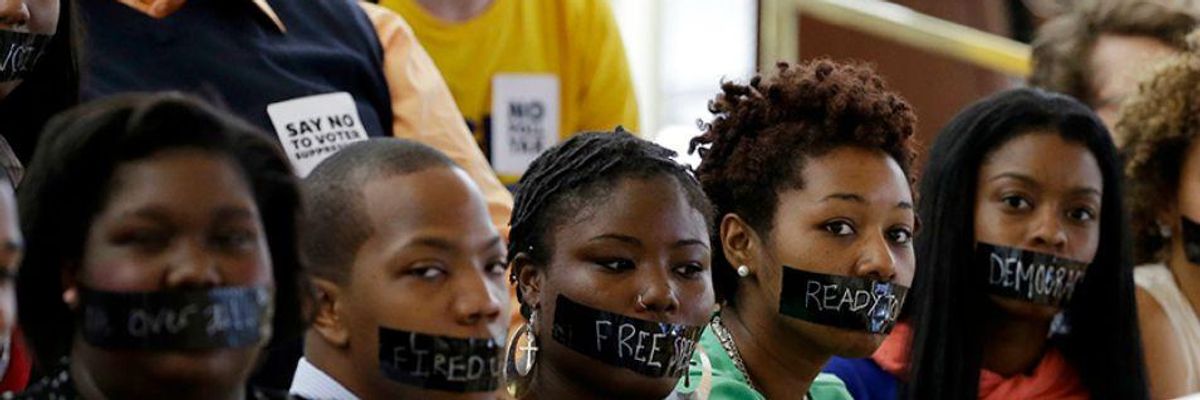As long as I count the votes, what are you going to do about it?
-- William Marcy Tweed, Tammany Hall Statement (1871)
The flag goes down and the bars go up. There's a nice synchronicity to it. Of course it was nothing more than a coincidence. The efforts to raise the bar have been going on at least as long as the efforts to lower the confederate flag. In the overall scheme of things the bar may be more important than the flag. The flag is symbolic. The bar is practical with a significant political impact. The bar is, of course, the efforts of Republican legislators in some southern states to make it more difficult for minorities to vote. A challenge to North Carolina's efforts opened in a federal court on July 13, 2015. The question for the court to answer was whether or not the new rules discriminate against black voters.
The U.S. Supreme Court paved the way for the new laws when, in 2013, it struck down the heart of the Voting Rights Act of 1965. The tone of the opinion was set during the oral arguments in which those who favor voting barriers asked questions of the lawyers appearing before them. Justice Scalia was very concerned with something called "racial entitlement." As he explained during oral argument when the voting rights act was being considered by him and his colleagues, it was important for them to put an end to "racial entitlement" because only he and his colleagues had the courage to do it. Members of Congress, said he, are afraid of coming out against Sections 4(b) and 5 of the 1965 Voting Rights Act because they don't want to be seen as being against such a popular act. (Section 5 of the Act requires States to obtain federal permission before enacting any law related to voting and Section 4(b) imposes that requirement only on States in which there had been entrenched racial discrimination in voting.) Since not all states were required to have preapproval from the federal government before changing their election laws Chief Justice Roberts in the majority opinion said there had to be a good reason to treat one state differently from another and in his opinion he said the Court found no such reasons. As Chief Justice Roberts explained, in striking down Section 4(b), the exceptional and unique conditions that once existed with respect to how some southern states treated voters and, therefore, justified that section of the statute, no longer exist.
No sooner did the U.S. Supreme Court issue its opinion than North Carolina and other southern states began enacting tougher election laws. In North Carolina state officials explained that the changes were intended to treat all voters equally and were designed to prevent fraud, ensure electoral integrity and reduce administrative burdens.
Elimination of fraud has been one of the most frequently cited reasons for strengthening the election laws and especially the voter ID laws in states in which those changes have been introduced. Examples of the perceived presence of fraud abound. All that is missing is fraud itself. Three examples suffice.
In 2012 Colorado's Secretary of State observed there were 11,805 non-citizens on the voter rolls, a number he then reduced to 3,903. After sending out letters to those people he concluded there were 141 non-citizens on the voter rolls or .0041 of the voters in the state. In Florida the Division of Elections said there might be 180,000 non-citizens on the roll but that number, too, proved elusive. There were 207 non-citizens on the rolls and none of them had ever voted. South Carolina found 3 cases of voter fraud since 2000 and used that alarming finding as justification for toughening its election laws.
In North Carolina the legislation that is being challenged in federal court in a trial that began in mid-July put an end to same day voter registration, reduced the number of early voting days and ended a program to pre-register high school students. Arguing in support of the law's provisions, North Carolina's attorney general says that what those objecting to the new provisions are seeking is "the equivalent of election law affirmative action." Plaintiffs, said he, "are arguing for practices that are favored by political organizations dedicated to maximizing Democratic turnout." It is obvious to him that if fairness in voting practices is the goal of a group it is important to make sure that they are not seeking fairness only to benefit one political party but to benefit the entire voting process. A federal court will determine who is right.
If the case ends up before the U.S. Supreme Court as presently constituted, the outcome is a foregone conclusion. The majority will echo the words of Thomas Farr, one of the attorneys representing North Carolina. Speaking rhetorically he asked: "What's the dastardly thing that North Carolina has done? What they did was they enacted regulations that represent majority rule throughout the United States." Although a singularly awkward and meaningless explanation of what is at stake, one can easily imagine it being used by Justice Scalia should he be asked to write the majority opinion. The words have a nice ring to them and intoxicated with the sound of his own words, Justice Scalia always favors ring over substance.
